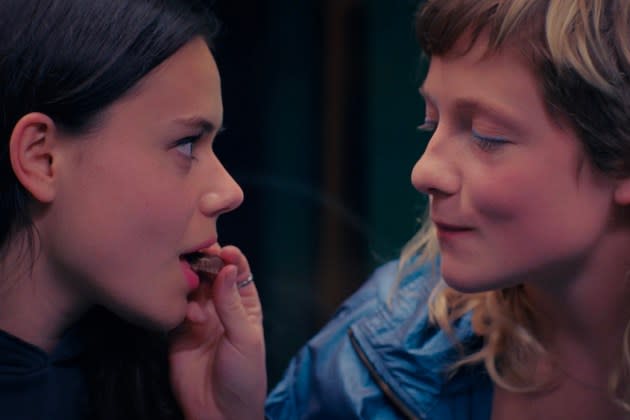‘Langue Étrangère’ Review: Two Foreign Exchange Students Fall for One Another in Volatile Teen Drama
- Oops!Something went wrong.Please try again later.

At age 17, there are only so many ways a high school student can flee a suffocating life. Bullied by her fellow students, Fanny (Lilith Grasmug) tried to commit suicide — or so she says — but fortunately, that didn’t work. Now, this shy, self-questioning and clearly troubled teen is counting on a foreign exchange program to make a fresh start, escaping to Leipzig, Germany, to get away from the mean girls back home in Strasbourg, France.
“Party Girl” co-director Claire Burger’s third feature, “Langue Étrangère,” splits its time between the two cities. The first half takes place in Leipzig, where Fanny forms an intense intellectual and erotic connection with her German pen pal, Lena (Josefa Heinsius). Fanny’s host is practically hostile when this uninvited foreigner first shows up, but that’s before a disarmingly candid (and frequently dishonest) Fanny starts to share stories invented to earn sympathy. By the second half, when activist-minded Lena comes to visit her in France, the two girls are practically inseparable, encouraging one another’s rebellion in increasingly dangerous ways. By the third act, what began as a teenage crush has snowballed into an alarming flirtation with the black bloc protest movement.
More from Variety
Translated into English, the double-meaning of the film’s title — “Foreign Tongue” — takes on a more overtly sexual connotation, one that could prove misleading if marketed under that name. Yes, the girls’ same-sex attraction lends the film a certain lesbian cachet, positioning the dynamic between them somewhere between “Water Lilies” and “Heavenly Creatures,” but that’s just one of the many levels on which Fanny and Lena’s unusual friendship operates.
Burger — who showed keen sensitivity toward a pair of young female characters in her exceptional, still undistributed 2018 family drama “Real Love” — recognizes that the generation in question is coming out of a global pandemic. That crisis landed at a critical moment in their development, and “Langue Étrangère” is one of the first contemporary adolescent dramas to factor these transformative changes on today’s youth. Burger’s screenplay was reportedly inspired by her own teenage participation in language exchange programs, though the film doesn’t feel out of date or nostalgic in the slightest (in fact, certain details, like a Zoom meeting between the French and German classrooms, could hardly feel more up-to-date).
For Fanny, reconnecting with her peers after the lockdown seems to have been especially difficult, which might excuse (or at least explain) her tendency to make up details that might earn her sympathy. At one point, embarrassed to tell Lena that she’d been crying on the phone to her mother, Antonia (Chiara Mastroianni), Fanny claims to have been talking to a pregnant friend whose father won’t let her get an abortion. Not realizing it’s a lie, Lena shares the story with her own mother, Susanne (Nina Hoss), and before Fanny can backtrack, the whole thing has gotten out of hand.
To Fanny and Lena’s concerned parents, adolescence seems as foreign a territory as another country might be. Mastroianni and Hoss play two very different mothers, each one limited by realistic, recognizable flaws. Susanne drinks too much. She never fully recovered from her last breakup, and in one especially upsetting scene, she lashes out at her ex for talking to her teenage houseguest. In a world of imperfect adults, parents don’t make for very reliable role models, which also goes for Fanny’s father, who may or not be having an affair. Fanny insists that he is, but by that point in the film, both Lena and the audience have started to question how many of the young fabulist’s stories they should really believe.
Whereas American movies tend to simplify the teenage experience to hormones and peer pressure, Burger presents a far more complex portrait of her two protagonists in all their contradictions. That makes for a more unpredictable coming-of-age story overall, even as it makes some of their behaviors a bit trickier to interpret. At times, it’s unclear whether Burger is showing events as they happen or in the more heightened way Franny imagines them. An steaming hot tub in Lena’s backyard is a place of intimate seduction for the pair, but the final scene (of the film’s Germany-set first half) feels a little too racy to have actually occurred. Same goes for the very last sequence in the film, which seems to represent a fulfilment of Lena’s anarchic fantasies, directly contradicting what came just before.
Though tricky to untangle in places, “Langue Étrangère” is more than just another same-sex first-love story (even if it delivers on so many key elements of that genre). By exploring the cultural differences between a French and German girl — as well as their classmates in both schools — Burger taps into the broader way these neighboring countries relate today, nearly 80 years after World War 2. Reacting against the shameful legacy of Germany’s past, Lena winds up flirting with a risky Antifa-like faction. Meanwhile, as the daughter of a white mother and Arabic father, Franny embodies France’s conflicted attitudes toward Middle Eastern immigrants. There’s no question that Burger intends both characters to be read as individuals, but their relationship leaves plenty of room for interpretation.
Best of Variety
Sign up for Variety’s Newsletter. For the latest news, follow us on Facebook, Twitter, and Instagram.
